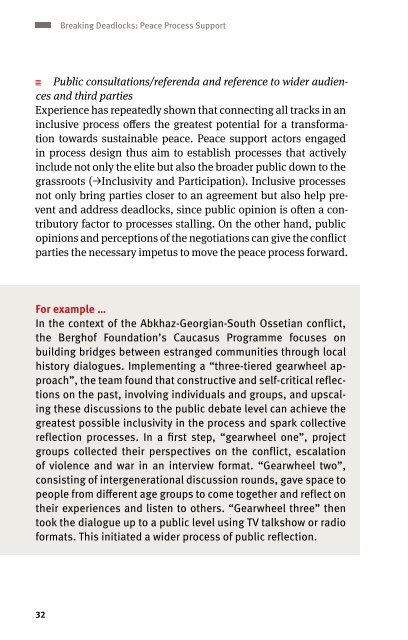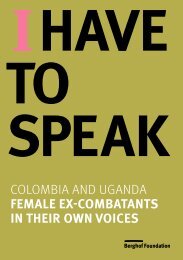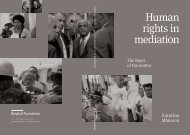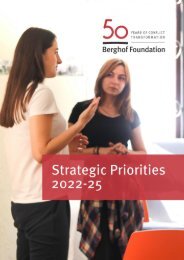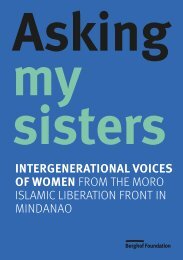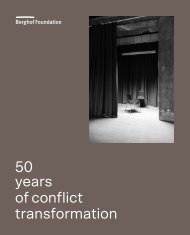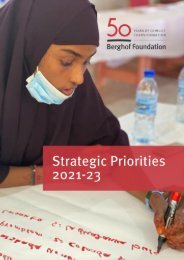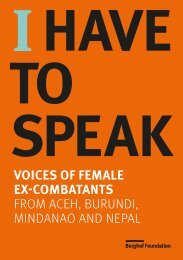Berghof Glossary on Conflict Transformation
The Berghof Glossary on Conflict Transformation presents 20 of the main principles and approaches used by the Berghof Foundation in its work. It is a concise and accessible exploration of what it takes to create “space for conflict transformation”. 2019 edition.
The Berghof Glossary on Conflict Transformation presents 20 of the main principles and approaches used by the Berghof Foundation in its work. It is a concise and accessible exploration of what it takes to create “space for conflict transformation”. 2019 edition.
You also want an ePaper? Increase the reach of your titles
YUMPU automatically turns print PDFs into web optimized ePapers that Google loves.
Breaking Deadlocks: Peace Process Support<br />
Public c<strong>on</strong>sultati<strong>on</strong>s/referenda and reference to wider audiences<br />
and third parties<br />
Experience has repeatedly shown that c<strong>on</strong>necting all tracks in an<br />
inclusive process offers the greatest potential for a transformati<strong>on</strong><br />
towards sustainable peace. Peace support actors engaged<br />
in process design thus aim to establish processes that actively<br />
include not <strong>on</strong>ly the elite but also the broader public down to the<br />
grassroots (→Inclusivity and Participati<strong>on</strong>). Inclusive processes<br />
not <strong>on</strong>ly bring parties closer to an agreement but also help prevent<br />
and address deadlocks, since public opini<strong>on</strong> is often a c<strong>on</strong>tributory<br />
factor to processes stalling. On the other hand, public<br />
opini<strong>on</strong>s and percepti<strong>on</strong>s of the negotiati<strong>on</strong>s can give the c<strong>on</strong>flict<br />
parties the necessary impetus to move the peace process forward.<br />
For example …<br />
In the c<strong>on</strong>text of the Abkhaz-Georgian-South Ossetian c<strong>on</strong>flict,<br />
the <str<strong>on</strong>g>Berghof</str<strong>on</strong>g> Foundati<strong>on</strong>’s Caucasus Programme focuses <strong>on</strong><br />
building bridges between estranged communities through local<br />
history dialogues. Implementing a “three-tiered gearwheel approach”,<br />
the team found that c<strong>on</strong>structive and self-critical reflecti<strong>on</strong>s<br />
<strong>on</strong> the past, involving individuals and groups, and upscaling<br />
these discussi<strong>on</strong>s to the public debate level can achieve the<br />
greatest possible inclusivity in the process and spark collective<br />
reflecti<strong>on</strong> processes. In a first step, “gearwheel <strong>on</strong>e”, project<br />
groups collected their perspectives <strong>on</strong> the c<strong>on</strong>flict, escalati<strong>on</strong><br />
of violence and war in an interview format. “Gearwheel two”,<br />
c<strong>on</strong>sisting of intergenerati<strong>on</strong>al discussi<strong>on</strong> rounds, gave space to<br />
people from different age groups to come together and reflect <strong>on</strong><br />
their experiences and listen to others. “Gearwheel three” then<br />
took the dialogue up to a public level using TV talkshow or radio<br />
formats. This initiated a wider process of public reflecti<strong>on</strong>.<br />
32


